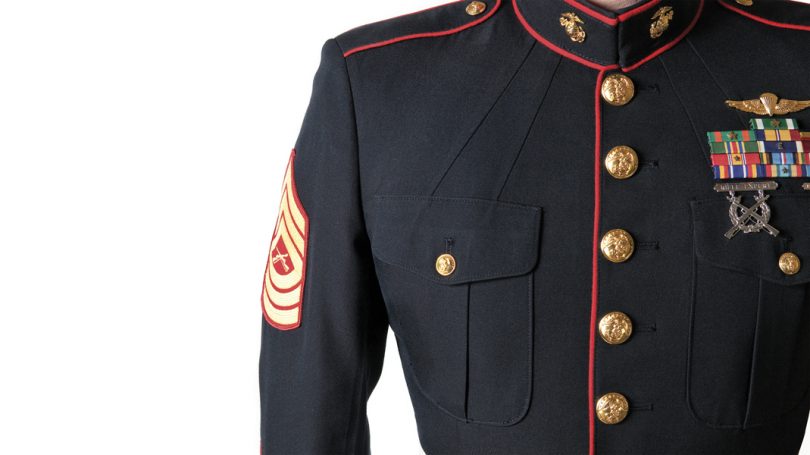Written by Barrett Baker
W&M and VCU are working together to provide a safety net for those who serve
Post-traumatic stress disorder, or PTSD, is an unfortunate circumstance of war that haunts many of our service men and women long after they’ve returned home. By definition, PTSD is the result of being involved in a traumatic accident where there is a direct threat of being killed or seriously harmed, or where a soldier witnessed someone else being killed or seriously harmed.
The scars left on the human brain by PTSD are not only invisible to the naked eye, they’re often difficult to diagnose. As the conflicts in the Middle East wind down and troops return state-side, an already over-burdened Department of Veterans Affairs (VA) is bracing for the challenge of attending to the increased volume of service people trying to re-adjust to civilian life, without a significant increase in resources.
To help meet the potential surge, the Lewis B. Puller Jr. Veterans Benefits Clinic—an extension of William & Mary Law School—is teaming up with the Center for Psychological Services and Development at Virginia Commonwealth University to help secure fair disability compensation and medical benefits, accurate diagnosis of service-related injuries, psychological and social counseling, and treatment for returning service men and women.
“My husband, Mark D. Matthews, and I started the clinic because we both went to law school at William and Mary and served as Judge Advocate General (JAG) attorneys in the Army,” says Stacey-Rae Simcox, adjunct professor of law at William & Mary, and managing attorney for the Lewis B. Puller Jr. Clinic. “When we returned from duty my husband had difficulty filing his own disability claim and we started thinking, ‘If two lawyers can’t figure this out, no one is going to be able to.’ That’s when we decided the clinic would be a good idea, and it has just exploded from there.”
The formal announcement of the clinic’s formation was on Veterans Day 2008. They began recruiting W&M law students to work on cases and opened their doors to veterans in January 2009.
The center is available to all veterans and is named after Lewis B. Puller Jr., a Lieutenant in the Marines who lost both his legs and parts of both hands while serving in Vietnam in 1968. After years of rehabilitation, Puller earned a law degree at William & Mary and worked as an advocate for veterans. He later wrote his Pulitzer Prize-winning autobiography Fortunate Son, which chronicled his struggle to overcome his physical and emotional injuries. His battle with alcohol, painkillers and depression eventually brought his struggles to an end when he committed suicide in 1994.
About PTSD
PTSD, especially when combined with a traumatic brain injury (TBI), can be difficult to recognize in the field. It’s not until much later that the symptoms start to manifest.
“When a soldier experiences a severe TBI, that’s pretty easy to diagnose because you can see the wound and the victim may be knocked unconscious for several hours or be in a coma, and that’s when they get medevac’ed to a hospital in Germany or somewhere similar,” says licensed clinical psychologist Leticia Flores, Ph.D., director for the Center for Psychological Services and Development at VCU. “But if someone sustains a moderate or mild head injury and they saw five of their friends get injured in a firefight, they may not notice any issues until they get home and find that they’re having problems with memory or following complex instructions.”
Other symptoms of PTSD or TBI include flashbacks, vigilance and hyper-sensitivity—which may cause sleeplessness, edginess, and a feeling of vulnerability and/or detachment.
“The VA system is overwhelmed and they don’t have enough practitioners, so oftentimes the most they can do is a cursory evaluation and assessment,” says Flores. “They can’t do the eight- or 10-hour evaluations we can do as a training clinic to really find out what is going on inside someone’s head. Getting a good diagnosis is really a matter of having available resources.”
The relationship between the Lewis Puller Jr. Clinic and the VCU Center for Psychology is a unique partnership that Simcox hopes to expand to a national level through HMVHE (or Humvee)—”Helping Military Veterans through Higher Education.” The program currently brings together Virginia’s colleges and universities to provide life-changing assistance to veterans while educating college students with real-world clinical experience.
Students from W&M, VCU and other schools in the Commonwealth do a majority of the legwork on cases, under the supervision of a practicing attorney or a licensed clinical psychologist. According to Simcox, a typical PTSD or TBI case requires around 330 hours of time to investigate. Flores estimates that she and her students put in around 70 hours for each case referred to them by the W&M clinic.
Services to veterans are provided free of charge.
“We are funded partially by William & Mary and VCU in that they provide us with facilities and professors,” says Simcox. “But the rest comes from grants and fundraising. We received two large grants from the Jessie Ball duPont Foundation—one for the startup of the clinic and one for forming HMVHE, but the rest is coming from private donations. Every little bit helps to move our mission forward.”
For Additional Information
The Lewis B. Puller Jr. Veterans Benefits Clinic &VCU’s Center For Psychological Services And Development
http://law.wm.edu/academics/programs/jd/electives/clinics/veterans/

